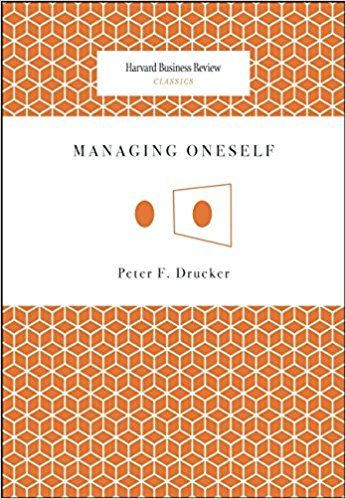Managing Oneself by Peter F. Drucker - Summary and Book Notes
A short but incredibly useful impetus to learn about oneself.

Review
Originally an article for The Harvard Business Review, this short volume covers how to create your career path by understanding yourself.
As it's not really a full book, there aren't any how-to guides or in-depth tactics for figuring out who you are or how to manage yourself. Drucker's writing is clear, and prompts you to take action. The book/article serves more as motivation to reflect, especially on things that you might've assumed you don't need to think about. I highly recommend this book for:
- Fresh college graduates who feel lost
- Anyone looking to become excellent but unsure of where to go
Buy "Managing Oneself" on Amazon or check it out at the library.
=======
Quick Summary

If you want to be an excellent knowledge worker, you need to become your own CEO. Use feedback analysis and reflection to learn about yourself. Put yourself in an environment that aligns with your strengths, working style, and values. Understand how your coworkers operate, so you can all play off of eachother's strengths.
Notes
The following are rough notes I took while reading. These are mostly paraphrased or quoted directly from the book. My thoughts are in italics.
Feedback Analysis
The only way to discover your strengths is through feedback analysis. Whenver you make a key decision, write down what you expect will happen. Nine or twelve months later, compare the actual results with your expectations.
I have a section in OneNote for a 'decision journal'. More on the subject from Farnam Street.
On Weaknesses vs. Strengths
Waste as little effort as possible on improving areas of low competence. It takes far more energy and work to improve from incompetence to mediocrity than it takes to improve from first-rate performance to excellence.
I'm not sure how true this is. In my experience there's tons of low-hanging-fruit at the bottom, and reaching the top is a game of diminishing returns. Perhaps the gains attained going from incompetence to mediocrity aren't worth the time?
Know thyself
We might feel that we know ourselves, but truly understanding yourself takes a lot of feedback analysis, and a lot of time.
- What are my strengths?
- How do I learn?
- Reading or listening?
- How do I work?
- Alone or with others?
- Am I a teacher or not?
- What are my values?
- Different than ethics
- Long or short term results?
- Deep connection with a few or shallow with many?
- Are you aligned with your company's values?
- Where do I belong?
- Big corporation or small startup?
- Stressful or structured environment?
- Can be easier to ask, where do I not belong? (via negativa)
- What should I contribute?
Successful careers are not planned. They develop when people are prepared for opportunities because they know their strengths, their method of work, and their values. Knowing where one belongs can transform an ordinary person into an outstanding performer.
Planning
What does the situation require? Knowing myself, how can I make the greatest contribution?
Don't look too far ahead, keep it clear and specific, under 18 months [1].
Goals/Results should be hard, but within reach. They should make a difference, be visible, and measurable.
Relationships
Very few people work by themselves and achieve results by themselves.
To be effective you have to know the strengths, performance modes, and values of your coworkers.
Take responsibility for communication
Long term
It used to be that organizations outlived workers. Now the opposite is true, workers outlive organizations, and they are mobile. The need to manage oneself is therefore creating a revolution in human affairs.
Buy "Managing Oneself" on Amazon, read it on Kindle Unlimited

, or check it out at the library.
If my notes piqued your interest, give the whole thing a read, it's very short. Let me know what you thought of the book.
### Notes: [1]: I use 90 days for planning, it's a long enough to get major things done but short enough to not seem too daunting.




Member discussion